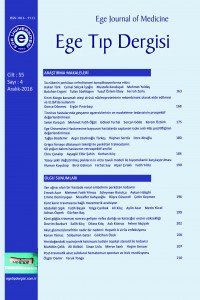Abstract
Aim: In this study, we aimed to develop an ELISA (Enzyme-Linked Immuno Sorbent Assay) kit to determine specific CCHFV (Crimean-Congo Hemorrhagic Fever Virus) immunoglobulins in serum samples from patients. Materials and Methods: cDNA has been obtained from total RNA extracted from serum samples of patients diagnosed with CCHF admitted to Infectious Diseases Outpatient Clinic of Sivas Cumhuriyet University Faculty of Medicine. Turkish CCHFV strain-specific primers were designed and amplification of the target region, the nucleoprotein gene, was performed by nested-PCR method. The PCR product has been cloned into the plasmid vector pQE30. To test whether the viral protein was produced, the plasmid DNA carrying the interested gene has been transformed to E.coli M15 strain. After induction with IPTG (Isopropyl β-D-1-thiogalactopyranoside), protein expression level has been determined by SDS-PAGE). Protein purification has been carried out using nickel chelate affinity chromatography and gel filtration method. The purified protein concentration has been calculated using Bicinchoninic Acid Protein Assay Kit (Sigma). Purified recombinant protein coated ELISA plates have been used for screening specific antibodies in the sera of the patients. Results: The cloned 363 base-pair CCHFV fragment has been expressed in E.coli M15 cells and the recombinant protein has been purified by gel filtration method. About 2 mg/ml protein has been obtained from one liter E. coli cell culture and has been tested with sera of 30 CCHV RT-PCR (Reverse transcription polymerase chain reaction) positive patients using indirect ELISA and 24 of them have been determined positive. Conclusion: In our study, the CCHFV recombinant protein has been obtained and could be used in ELISA test.
Kırım Kongo kanamalı ateşi virüsü nükleoproteininin rekombinant olarak elde edilmesi ve ELISA'da kullanımı
Abstract
Amaç: Çalışmamızda hasta serum örneklerinde bulunan KKKAV (Kırım Kongo Kanamalı Ateşi Virüsü) spesifik immunoglobulinlerini belirlemek üzere ELISA (Enzyme-Linked Immuno Sorbent Assay) kiti geliştirilmesini amaçladık. Gereç ve Yöntem: Sivas Cumhuriyet Üniversitesi Tıp Fakültesi Enfeksiyon Hastalıkları polikliniğine başvuran, KKKA tanısı konan bireylerin serum örneklerinden ekstrakte edilmiş toplam RNA'lardan cDNA eldesi sağlandı. KKKAV Türk suşuna özgü primerler dizayn edildi, nested-PCR yöntemiyle cDNA'lardan hedef gen bölgesinin (nükleoprotein geni) amplifikasyonu sağlanarak PCR ürünü pQE30 plazmid vektörüne klonlandı. İlgili virüs proteininin üretilip üretilmediği virüs genini taşıdığı tespit edilen plazmid DNA'larının E.coli M15 suşlarına transformasyonu ve IPTG (Isopropyl β-D-1-thiogalactopyranoside) ile indüksiyonu sonunda ekspresyon düzeyi SDS-Poliakrilamid jel elektroforezi (SDS-PAGE) ile belirlendi. Protein saflaştırma işlemi nickel chelate affinity chromatography ve jel filtrasyonu yöntemine göre gerçekleştirildi. Bicinchoninic Acid Protein Assay Kit (Sigma) kullanılarak saflaştırılan proteinin konsantrasyonu hesaplandı ve ELISA plakları saflaştırılan rekombinant proteinle (antijenle) kaplanarak, hasta serumlarında spesifik antikorlar tarandı. Bulgular: Klonlanan 363 baz çiftlik KKKAV fragmenti E.coli M15 hücrelerinde eksprese edilmiş ve rekombinant protein jel filtrasyonu yöntemi ile saflaştırıldı. Bir litrelik E.coli hücre kültüründen yaklaşık 2 mg/mL protein elde edildi. Bu protein İndirekt ELISA yönteminde 30 CCHV RT-PCR (Reverse transcription polymerase chain reaction) pozitif hasta serumu ile test edildi ve 24'ünün pozitif olduğu tespit edildi. Sonuç: Çalışmamızda, KKKAV rekombinant proteini elde edilerek ELISA testinde kullanılması sağlanmıştır.
Details
| Other ID | JA24CU47HJ |
|---|---|
| Authors | |
| Publication Date | December 1, 2016 |
| Submission Date | December 1, 2016 |
| Published in Issue | Year 2016 Volume: 55 Issue: 4 |
Cited By
Bibliometric analysis of scientific research on Crimean-Congo hemorrhagic fever in Turkey
Demiroglu Science University Florence Nightingale Journal of Medicine
https://doi.org/10.5606/fng.btd.2021.25064
Ege Journal of Medicine enables the sharing of articles according to the Attribution-Non-Commercial-Share Alike 4.0 International (CC BY-NC-SA 4.0) license.

